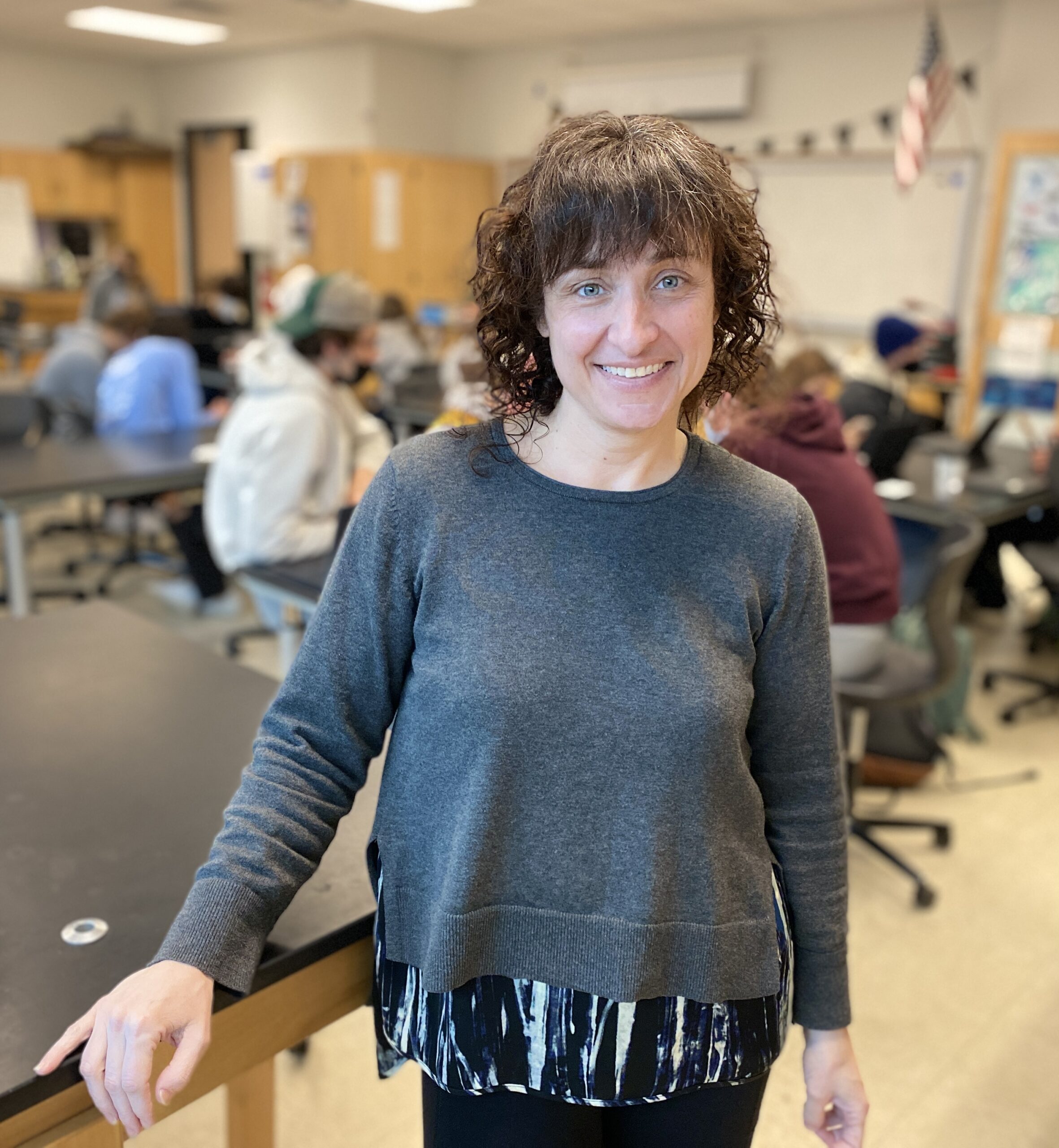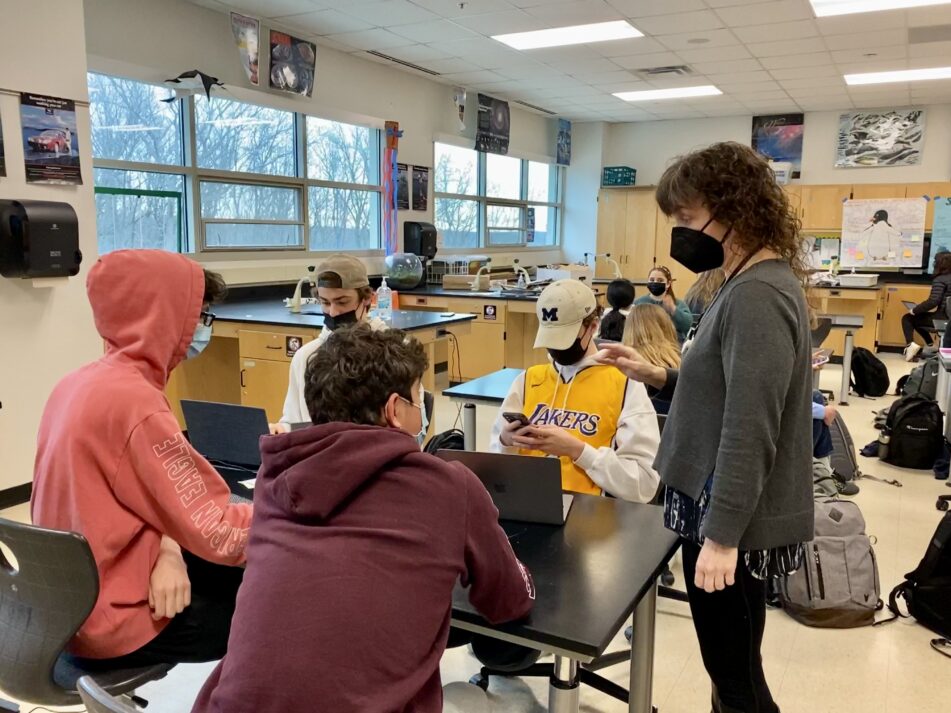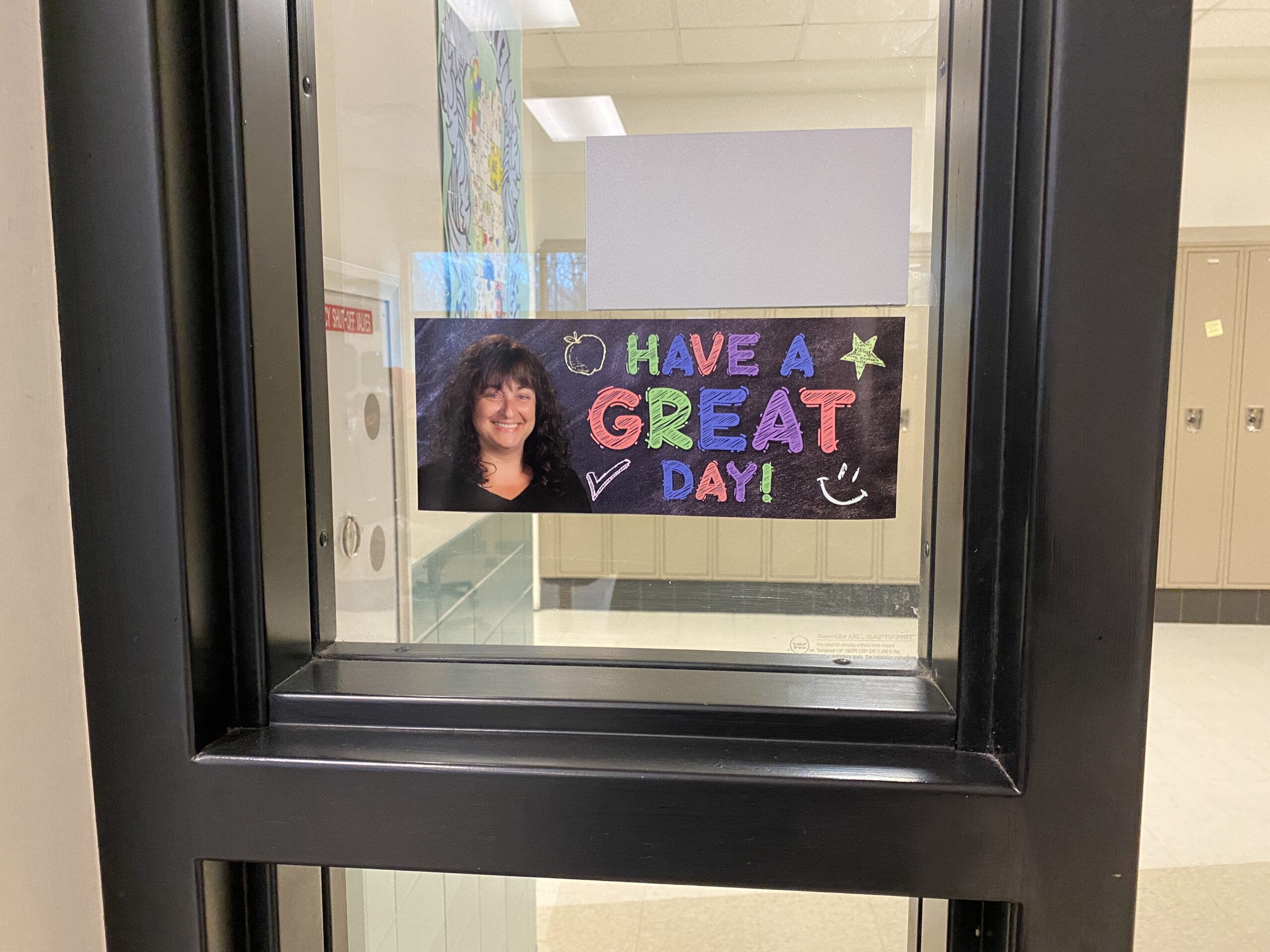

Skyline science teacher Casey Warner has just been named a University of Michigan Chapter of Sigma Xi (a scientific research honor society) 2022 Teacher of the Year.
Her colleagues agree the award is well-deserved.
Skyline science teacher Mike Jones has worked with Warner on various projects and committees, including testing, equity, curriculum development, curriculum coordination/implementation, and Skyline’s leadership team.
“What I admire most about Casey Warner is her heart-felt and caring ability to remain focused on what really matters: the children we teach,” says Jones. “Her heart is truly for our students and for their present and future success. She sincerely advocates for them on all levels and she partners with anyone who is going to ensure their success—parents, counselors, fellow teachers, and most of all, the students themselves. She not only cares for her students but for people all around her. She constantly asks, “How can I support you?” Casey is truly a great colleague to work with and a great friend.”
Sigma Xi conducts an annual Science/Math Teacher of the Year Award for middle and high schools in the greater Washtenaw County area to promote excellence in the teaching of science and math. This year, the award was presented to Warner and Alyson Thompson, who works at Washtenaw High School and Middle Academy in Ypsilanti.
Warner was nominated by her 10th grade student Sari Woo, who was in Warner’s AP Environmental Science class and noted: “She is very helpful to her students and is jovial and bright and very knowledgeable in her subject.”

Warner has been teaching in the Ann Arbor Public Schools for 20 years. She has taught at Huron, Pioneer, and Skyline, and has taught nearly every science class available. She currently teaches biology and AP environmental science at Skyline High School. As a teacher, she has received two awards, “Celebration of Excellence” in 2007, and “Outstanding Educator” in 2018.
Warner has been a department head at Skyline since 2019, has planned and facilitated professional development of Science Teachers, and has mentored new teachers, among other duties. During the Covid crisis, she facilitated the creation of the online curriculum for all AAPS biology teachers and trained teachers weekly to use the online platform Schoology in the Biology Teacher Learner Network. She worked as a summer curriculum assistant for the University of Michigan Center for Engineering Diversity and Outreach (2019 – 2021), developed the 2019 curriculum for evaluating student progress, and trained instructors for professional growth.
Skyline physics and earth science teacher Kesha Barton says she admires Warner’s willingness to put in the extra work so her students get what they need.
“She goes above and beyond every day,” says Barton. “Casey is caring, supportive, enthusiastic, and very knowledgeable about science content. A great colleague to talk to and someone to bounce ideas off of.”
Warner grew up in Southfield but fell in love with the ocean at a young age. By fifth grade, she was certain she wanted to be a marine biologist/ oceanographer. Despite living nowhere near an ocean, over the years she found ways to pursue her passion by taking summer classes on both coasts, as well as participating in a long-term study of Orca whales in Puget Sound.
Warner earned a bachelor’s degree in biology and geological oceanography from the University of Michigan, as well as a master’s degree in oceanography (marine geology and geochemistry) from the University of Michigan. However, she fell in love with teaching, and went back to school to earn a master’s degree in education from the University of Michigan, and has been teaching in AAPS since then.
Warner lives in Saline with her family, which includes her husband, Brian, their children Alexandria, 11, and Jameson, 8, and their two dogs. She spends as much time as possible outdoors, hiking, biking, and gardening. She is passionate about the environment, her family, and her students.
What inspired you to become a teacher?
I was working in the Caribbean doing coral reef research, and scuba diving three times a day. It was amazing! But I found that as much as I loved doing the research, I was even more excited to teach the tourists and locals about what we were learning during our dives. Every evening we would give talks about our research, and that quickly became my favorite part of the day. I realized that as much as I love science, I love sharing science with others even more. So I went back to school to get my degree in Education.

Why science?
There has never been a greater passion for me than science. I love figuring out the answers to questions, I love doing experiments, and I love learning new things. As a child, my mother encouraged my interest; we would perform dissections on preserved worms and starfish at our kitchen table, raise monarch butterflies, and just spend hours exploring the natural world. Science was always my favorite subject in school. I would spend my summers doing science-related camps and activities with highlights being Space Camp in 7th grade; a marine science class in California in 10th grade; a marine science class on Appledore Island, Maine with only 16 humans and 2,000 seagulls as residents on the island in 11th grade; and a research project on Orca whales in Puget Sound, Washington the summer after 12th grade.
When you recall your first year of teaching, what memories stand out?
Feeling like I had no idea what I was doing, but being so thankful for all of the wonderful teachers and administrators that supported me. Feeling overwhelmed. I remember a trip to Chicago to visit my friend and I spent the entire weekend holed up in her apartment, grading papers.
What advice would you give to a first-year teacher?
Find your people. The ones that will help you with last-minute lessons, that you can bounce ideas off of, that will help you brainstorm solutions to problems, that will hold you up when you need it. Don’t be afraid to ask for help. We all need it. Nobody is perfect.
How would you describe your teaching style?
I am a very enthusiastic teacher, very passionate about the subjects I teach. I feed off of the energy and enthusiasm of my students. I am very organized and know where we need to get to in our learning, but I follow what my students need. If they are interested in something or need more time to understand something, then we spend more time on it. If something is boring or they understand it well, we move on. I am constantly adjusting based on their needs, so I am very organized but also very flexible.
In your 20 years in AAPS, what’s the most important thing you’ve learned about teaching? About learning?
In my 20 years in AAPS, possibly the most important thing I’ve learned is to let the little things go and always come from a positive place when speaking with students. For example, if a student is frequently late to class, asking if everything is okay rather than asking why they are always late makes a big difference in the way the conversation goes.
What do you wish everyone realized about the work of a teacher?
It literally never ends. I don’t just mean grading in the evening and on weekends, writing letters of recommendation while sitting at my kids’ sports events, etc. When I leave Skyline, I am still thinking about my students, worrying about the ones I didn’t see or connect with that day and debating if I should email or call them to check-in, things like that. And even when I’m sitting on the beach in summer, I’m collecting sand samples to show my students sediment sizes. At the grocery store, I’m grabbing a few random items for the upcoming lab we are doing. When I’m driving to work, I’m going through the lessons for the day and wondering how I can make them better. Teaching is a never-ending job, but I love it!
What’s one of your hidden talents?
I don’t know if it’s a talent, but I am learning how to kickbox.
What makes teaching at Skyline unique?
I was lucky to be part of the team that helped to plan Skyline in the years leading up to its opening. We did extensive research about best practices, and it is so exciting to be a part of seeing these things in action- such as trimesters, Skytime, mastery teaching and learning, magnet programs, etc.
I don’t know if this is unique or not, but we also have an absolutely amazing staff and everyone is so helpful and supportive, I really enjoy the people I work with.
Additionally, we have incredible students. I love the diversity of our student body; I enjoy talking with my students and feel like I am constantly learning so much from them.
How do you keep students engaged?
I hope that my excitement and passion for the topics translate to my teaching, and help to keep students engaged. I also teach in a variety of methods, so that students don’t get bored or into too much of a rut. I also make them a part of the learning, constantly checking in with them to see what they want and need from class.
What is the most rewarding part of teaching?
The students, of course. In particular, when a student enters my room with the belief that they “can’t do science” and leaves my room at the end of the term with, at the very least, confidence that they can “do science”. At best, I love it when students tell me that it is because of my class that they are considering studying science in the future. You can’t get a better compliment than knowing you made a difference in someone’s life like that!
How do you spend your summers?
Outside as much as possible, hopefully near water. I take my kids to the beach a lot, and we always go camping at least once. I also spend a lot of time revising lessons and trying to come up with new labs and activities for the upcoming school year.

Be the first to comment